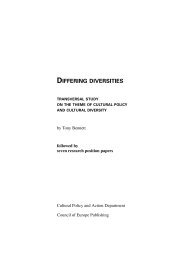Why we need European cultural policies: the impact of EU ...
Why we need European cultural policies: the impact of EU ...
Why we need European cultural policies: the impact of EU ...
Create successful ePaper yourself
Turn your PDF publications into a flip-book with our unique Google optimized e-Paper software.
introduces <strong>the</strong> possibility <strong>of</strong> making reductions from one’s taxable income forpersons who are members <strong>of</strong> <strong>the</strong> creative unions.’(Latvia)Except for some minor changes, directly linked with <strong>the</strong> harmonization, such as <strong>the</strong> Slovenianexample, reform <strong>of</strong> <strong>the</strong> social security regulations has not been exclusively inspired or influencedby <strong>the</strong> acquis communautaire. In fact, this issue and its relevance for <strong>cultural</strong> policy can beexamined at two different levels. First, <strong>the</strong>re is <strong>the</strong> importance <strong>of</strong> <strong>the</strong> social security protectionregulations for artists within <strong>the</strong>ir own country, an issue that is still almost entirely left to eachmember state to decide. The second issue is how this affects mobility across borders,including not only regulations for <strong>EU</strong> nationals when working abroad but also those applicableto foreign artists;82 <strong>the</strong> diversity <strong>of</strong> systems creates many obstacles to <strong>the</strong> free movement <strong>of</strong>artists.For new <strong>EU</strong> member states and candidate countries, this issue has also been linked with <strong>the</strong>question <strong>of</strong> how to create at least similar opportunities for workers across <strong>the</strong> <strong>EU</strong> and how toavoid <strong>the</strong> negative consequences <strong>of</strong> social dumping sometimes involving <strong>the</strong> nationals <strong>of</strong> some <strong>of</strong><strong>the</strong>se countries (Audéoud 2002).Free movement <strong>of</strong> goods:relevance for movable <strong>cultural</strong> heritageThe next question focussed on possible, `changes in legislation regarding <strong>the</strong> free movement <strong>of</strong>goods, special export arrangements for national treasures and provisions facilitating <strong>the</strong> return <strong>of</strong><strong>cultural</strong> goods’.According to <strong>the</strong> responses, harmonization with <strong>the</strong> acquis communautaire on <strong>the</strong> topic <strong>of</strong> freemovement <strong>of</strong> goods within <strong>the</strong> internal market did not have much <strong>impact</strong>, or at least it was notperceived as having a direct <strong>impact</strong> on <strong>cultural</strong> <strong>policies</strong>. No negative effects <strong>we</strong>re reported. Somereplies mentioned tighter rules on <strong>the</strong> export <strong>of</strong> national heritage, aimed at better protection andpreservation.83Rules regarding <strong>the</strong> free circulation <strong>of</strong> goods have, from <strong>the</strong> beginning, taken into consideration<strong>the</strong> specificities <strong>of</strong> <strong>the</strong> art market and <strong>the</strong> trade <strong>of</strong> <strong>cultural</strong> objects. At <strong>the</strong> beginning <strong>of</strong> <strong>the</strong>transition, with <strong>the</strong> opening <strong>of</strong> borders, <strong>the</strong>re was a sudden increase in illegal export <strong>of</strong> antiquesfrom east and central <strong>European</strong> countries. Aligning legislation with <strong>EU</strong> standards certainly meant56Part 2 The <strong>impact</strong> <strong>of</strong> <strong>EU</strong> enlargement: results <strong>of</strong> <strong>the</strong> survey <strong>of</strong> researchers and policy-makers














